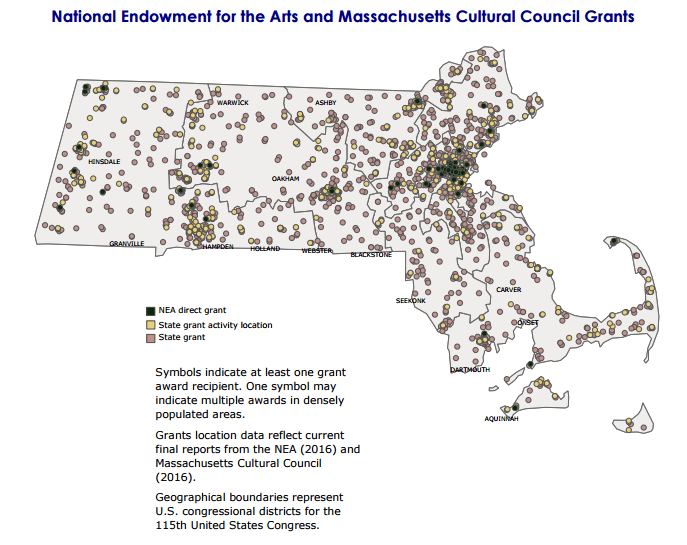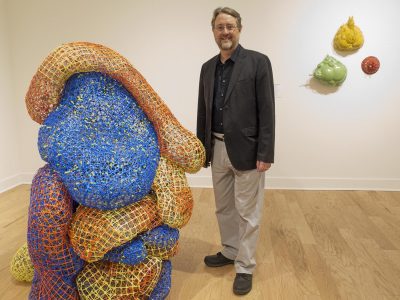Advertisement
'Culture Is A Fragile Thing': How Trump's Cuts To Arts Funding Would Affect Mass.
ResumePeople in the Massachusetts arts and culture ecosystem have been dreading the Trump administration’s budget proposal since rumors of arts funding cuts emerged a few months ago.
Then, in his budget outline released on Thursday, President Trump confirmed his intention to eliminate the National Endowment for the Arts. The NEA contributes millions of dollars to both large and small cultural organizations across Massachusetts.

While there have been battles to protect the NEA in the past, Massachusetts Cultural Council executive director Anita Walker says this feels different.
"This is the first time since the NEA was created more than 50 years ago that a president has proposed eliminating the NEA," Walker says. "So I think it’s a very sad day for our country."
Walker also says it's ironic that this news comes during the year that marks the centennial of Massachusetts son John F. Kennedy's birth.
"He was the one that laid the ground work for creation of the National Endowments for the Arts and Humanities," she said. "Because he believed that great civilizations embrace and build their foundation of freedom on an artistic platform."
This year, the NEA is making $3.5 million in grants in Massachusetts. About $1 million of that is being distributed by the Massachusetts Cultural Council to fund more than 700 cultural organizations and councils statewide. Walker says the money fuels big museums, little theater companies and everything in between — from the Cape to the Berkshires.
"These are not huge grants — they’re from $30,000 to $75,000 — but they have an enormous impact on their communities," Walker says.

She points to grants given to organizations that serve rural and economically-depressed communities.
"The Double Edge Theatre which is located in Ashfield, Massachusetts, got a grant from the NEA this year, and it’s being used to raise the visibility of farms and artists and crafts people," she says. "And in New Bedford, there’s a Working Waterfront Festival celebrating the history and the working skills of the fisherman in the area."
Cultural scenes in smaller towns and cities rely on grants from the NEA, says Fitchburg Art Museum director Nick Capasso.
"Unlike Boston or Cambridge or even Worcester, Fitchburg has no local infrastructure of arts philanthropy," he says. "There’s just nothing. The only way we can really raise money for some of these visionary projects is with the help of the NEA."
Those “visionary projects” include public art works that Capasso says resulted from the $75,000 Our Town grant the museum received directly from the NEA in 2012.

"Which not only helped to spruce up a downtown that could really use it, but also really jump started a conversation about the role of the arts and culture and creative economy in the city of Fitchburg," Capasso says.
Now the city and the museum are converting abandoned historic buildings into affordable artist live/work spaces. Capasso says they've applied for another Our Town grant to support a Cultural Master Plan for Fitchburg and are waiting to hear back.
According to its website, the NEA will operate as usual until a new budget is enacted by Congress.
David Tuerck, president of the Beacon Hill Institute for Public Policy Research in Boston, says he's ambivalent about the NEA itself, but thinks the president should’ve talked to the country about the federal government’s role in the arts before making such a drastic statement.
"I think the president made a big mistake of looking around for what he considers to be low-hanging fruit in terms of his own cultural and political values, and he's making an effort to get rid of a few things so it looks like he’s trying to pay for the expanded spending on defense, which by the way I applaud," he says.
Tuerk also says it would’ve been more responsible if the president had waited until he finalized tax reform that might stimulate taxpayers to support the arts, rather than tying the NEA cuts to a budget designed to bolster defense.
"I think it’s important even for conservatives like me to understand that our culture is a fragile thing and it’s not going to survive merely by people who buy tickets to concerts and tickets to museums," Tuerck says.
Congress is slated to approve a new budget in October. Between now and then representatives in Washington — and maybe even President Trump — will likely be on the receiving end of a lot of letters, calls, emails — and tweets — from artists and organizations in Massachusetts calling for the NEA’s survival.
This segment aired on March 17, 2017.
